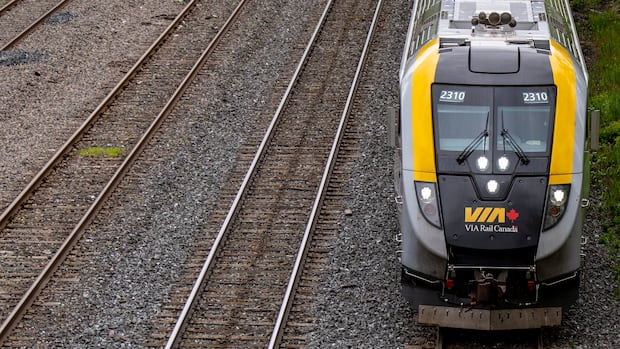PoliticsVia Rail has offered $31 million in travel vouchers to hundreds of thousands of passengers whose trains were more than one hour late since last fall, mostly as a result of new speed limits at rail crossings on CN tracks. Ongoing dispute with CN has caused record-breaking delays along Quebec City-Windsor corridorA Via Rail train is seen on tracks in Dorval, Que., as it heads out of Montreal on Friday, May 23, 2025. (Christinne Muschi/The Canadian Press)Via Rail has offered $31 million in travel vouchers to hundreds of thousands of passengers whose trains were more than one hour late since last fall, mostly as a result of new speed limits at rail crossings on CN tracks. Travel vouchers worth 50 per cent of fares are offered to passengers whenever a train is delayed by more than an hour on the Quebec City-Windsor corridor, the busiest stretch in Via’s system. The value goes up to 100 per cent when the delay exceeds four hours.The $31-million figure is equivalent to seven per cent of the Crown corporation’s total revenues in 2024, illustrating the extent of the problems experienced by passengers who have suffered record delays since the start of a conflict with CN during last year’s Thanksgiving weekend. “This is not good news for anyone. As taxpayers, we can’t be happy to have to pay penalties like these, and it is even worse for users,” said Jacques Roy, a retired professor who specialized in logistics at HEC Montréal.”This is really a reflection of bad service.”CN imposed speed restrictions a year ago at all rail crossings used by Via, arguing its new trains might not be long or heavy enough to activate security measures every single time.WATCH | Why the trains don’t run on time:Prior to the conflict, in August 2024, 45 per cent of Via trains along that corridor were on time, but by this August it had dropped to 29 per cent. “It’s a significant drop,” said Roy. “It’s a bit discouraging for users who already suffer from a lack of reliability.” Via considers its trains on that corridor to be on time when they come in within 10 or 15 minutes of their planned arrival.Since the start of the conflict, however, Via has calculated that about 15 per cent of its trains on that corridor were at least one hour late.Transport Minister Steven MacKinnon says Via’s performance is unacceptable, and is hurting both passengers and its business strategy. “This is obviously sub-optimal and we will have to focus very squarely on improving those results,” he said in an interview. WATCH | Historic delays on busy corridor:Via Rail, CN point fingers as late arrivals hit new highTardiness is nothing new at Via Rail, but late arrivals are reaching historic levels between Quebec City and Windsor as passenger trains have been forced to slow down at hundreds of rail crossings operated by CN Rail. The dispute between CN and Via is related to the number of axles on the latter’s new Venture trains, in use since 2022. When Via runs a train composed of one locomotive and five cars, there are only 24 axles, short of the 32 axles called for by CN to ensure that barriers and signals are activated at rail crossings.When a train nears a crossing, an electrical signal triggers those safety warnings — but the signal depends on the length and weight of the train. So CN imposed speed limits for Via trains at level crossings.Instead of a maximum cruising speed of 160 km/h, engineers often slowed to below 80 km/h at crossings to confirm that the safety features were activated, instead of relying on automated systems.After seeing passenger trains hit record delays in recent months, Via struck a stopgap deal with CN in August — allowing trains to roll at a constant, albeit reduced, speed over longer segments, without having to confirm the automatic activation of safety systems. “This new approach simplifies operations and offers the potential to reduce delays and improve reliability for passengers, but it is still too early to confirm the impact on our on-time performance,” said Via spokesperson Karl Helou. The first signs are encouraging, but Helou says it’s too early to say that problems have been resolved.”This is a step forward, but not a definitive solution,” he said. CN says the new speed limits ensure that the safety features at rail crossings are turned on quickly enough. But the dispute is still before Quebec’s Superior Court, which in April rejected Via’s request for an injunction removing the original restrictions. The federal Ministry of Transport is also seeking an agreement between the two parties, although the departure from cabinet of then-minister Chrystia Freeland created additional delays. Both Via and CN insist they will not compromise on safety, but cannot agree on the extent of the problem at level crossings and the measures needed to protect all passengers.ABOUT THE AUTHORGabriel Le Marquand Perreault has been a journalist with Radio-Canada since November 2020.
Wednesday, 8 Oct 2025
Canada – The Illusion
Search
Have an existing account?
Sign In
© 2022 Foxiz News Network. Ruby Design Company. All Rights Reserved.
You May also Like
- More News:
- history
- Standing Bear Network
- John Gonzalez
- ᐊᓂᓈᐯᐃᐧᐣ aninâpêwin — Truth
- Creation
- Beneath the Water
- Olympic gold medal
- Jim Thorpe
- type O blood
- the bringer of life
- Raven
- Wás’agi
- NoiseCat
- 'Sugarcane'
- ᐅᑳᐤ okâw — We remember
- ᑲᓂᐸᐏᐟ ᒪᐢᑿ
- This is what it means to be human.
- Nokoma
- Kanipawit Maskwa
- Native American names











